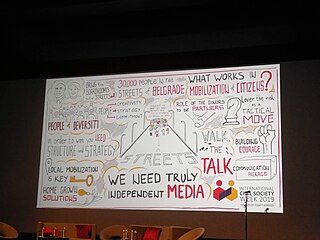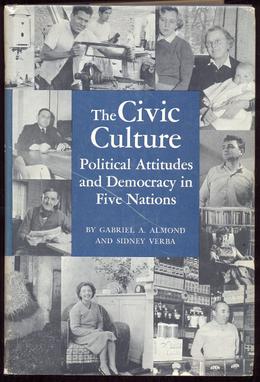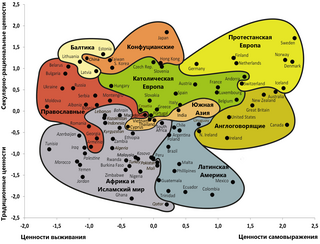Politics is the set of activities that are associated with making decisions in groups, or other forms of power relations among individuals, such as the distribution of resources or status. The branch of social science that studies politics and government is referred to as political science.

The Clash of Civilizations is a thesis that people's cultural and religious identities will be the primary source of conflict in the post–Cold War world. The American political scientist Samuel P. Huntington argued that future wars would be fought not between countries, but between cultures. It was proposed in a 1992 lecture at the American Enterprise Institute, which was then developed in a 1993 Foreign Affairs article titled "The Clash of Civilizations?", in response to his former student Francis Fukuyama's 1992 book, The End of History and the Last Man. Huntington later expanded his thesis in a 1996 book The Clash of Civilizations and the Remaking of World Order.

The World Values Survey (WVS) is a global research project that explores people's values and beliefs, how they change over time, and what social and political impact they have. Since 1981 a worldwide network of social scientists have conducted representative national surveys as part of WVS in almost 100 countries.

Civil society can be understood as the "third sector" of society, distinct from government and business, and including the family and the private sphere. By other authors, civil society is used in the sense of 1) the aggregate of non-governmental organizations and institutions that advance the interests and will of citizens or 2) individuals and organizations in a society which are independent of the government.
"Asian values" is a political ideology that attempts to define elements of society, culture and history common to the nations of Southeast and East Asia. It aimed to use commonalities – for example, the principle of collectivism – to unify people for their economic and social good. This contrasted with perceived European ideals of the universal rights of all individuals. The concept was advocated, particularly in the 1990s, by Mahathir Mohamad and by Lee Kuan Yew, as well as other Asian leaders. It has been often used by nondemocratic leaders to justify repression of political opponents, which has been described as violating their human rights, through the justification that "human rights are not part of Asian values".
Westernization, also Europeanisation or occidentalization, is a process whereby societies come under or adopt what is vaguely considered to be Western culture, in areas such as industry, technology, science, education, politics, economics, lifestyle, law, norms, mores, customs, traditions, values, mentality, perceptions, diet, clothing, language, writing system, religion, and philosophy. During colonialism it often involved the spread of Christianity.
Cultural conservatism is described as the protection of the cultural heritage of a nation state, or of a culture not defined by state boundaries. It is sometimes associated with criticism of multiculturalism, anti-immigration sentiment, and opposition to illegal immigration. Because their cultural preservationist objectives are in conflict with those of anti-racists, cultural conservatives are often accused of racism. Despite this, however, cultural conservatism can be more nuanced in its approach to minority languages and cultures; it is sometimes focused upon heritage language learning or threatened language revitalization, such as of the distinctive local dialect of French in Quebec, Acadian French, Canadian Gaelic, and the Mi'kmaq language in Nova Scotia and New Brunswick, or the Irish language in Newfoundland. Other times cultural conservatism is more focused upon the preservation of an ethnic minority's endangered ancestral culture, such as those of Native Americans.
Modernization theory holds that as societies become more economically modernized, wealthier and more educated, their political institutions become increasingly liberal democratic. The "classical" theories of modernization of the 1950s and 1960s, most influentially articulated by Seymour Lipset, drew on sociological analyses of Karl Marx, Emile Durkheim, Max Weber, and Talcott Parsons. Modernization theory was a dominant paradigm in the social sciences in the 1950s and 1960s, and saw a resurgence after 1991, when Francis Fukuyama wrote about the end of the Cold War as confirmation on modernization theory.
Ronald F. Inglehart was an American political scientist specializing in comparative politics. He was director of the World Values Survey, a global network of social scientists who have carried out representative national surveys of the publics of over 100 societies on all six inhabited continents, containing 90 percent of the world's population. The first wave of surveys for this project was carried out in 1981 and the latest wave was completed in 2019. From 2010 Inglehart also was co-director of the Laboratory for Comparative Social Research at the National Research University - Higher School of Economics in Moscow and St Petersburg. This laboratory has carried out surveys in Russia and eight ex-Soviet countries and is training PhD-level students in quantitative cross-national research methods. Inglehart died on 8 May 2021.
Democratic consolidation is the process by which a new democracy matures, in a way that it becomes unlikely to revert to authoritarianism without an external shock, and is regarded as the only available system of government within a country. A country can be described as consolidated when the current democratic system becomes “the only game in town”, meaning no one in the country is trying to act outside of the set institutions. This is the case when no significant political group seriously attempts to overthrow the democratic regime, the democratic system is regarded as the most appropriate way to govern by the vast majority of the public, and all political actors are accustomed to the fact that conflicts are resolved through established political and constitutional rules.
Sidney Verba was an American political scientist, librarian and library administrator. His academic interests were mainly American and comparative politics. He was the Carl H. Pforzheimer University Professor at Harvard University and also served Harvard as the director of the Harvard University Library from 1984 to 2007.

Gabriel Abraham Almond was an American political scientist best known for his pioneering work on comparative politics, political development, and political culture.

East Asia is a region of Asia, which is defined in both geographical and ethno-cultural terms. The modern states of East Asia include China, Japan, Mongolia, North Korea, South Korea, and Taiwan. Hong Kong and Macau, two small coastal cities located in the south of China, are autonomous regions under Chinese sovereignty. The economies of Japan, South Korea, China, Taiwan, Hong Kong, and Macau are some of the world's largest and most prosperous economies. East Asia borders Siberia and the Russian Far East to the north, Southeast Asia to the south, South Asia to the southwest, and Central Asia to the west. To the east is the Pacific Ocean and to the southeast is Micronesia.

Pippa Norris is a British American political scientist specializing in comparative politics. She is the McGuire Lecturer in Comparative Politics at the Kennedy School of Government, Harvard University, and she has served as the Australian Laureate Fellow and Professor of Government and International Relations at the University of Sydney, and Director of the Electoral Integrity Project.
A civic culture or civic political culture is a political culture characterized by "acceptance of the authority of the state" and "a belief in participation in civic duties". The term was first used in Gabriel Almond and Sidney Verba's book, The Civic Culture. Civic political culture is a mixture of other political cultures namely parochial, subject and participant political cultures. Almond and Verba characterised Britain as having a civic political culture. In "Is Britain Still a Civic Culture?" Patrick Seyd and Paul Whiteley discuss the extent to which Britain can still be regarded as having a civic political culture. The term civic culture is used to identify the political culture characteristics that explain the stability of a democratic society's political structure.

The Civic Culture or The Civic Culture: Political Attitudes and Democracy in Five Nations is a 1963 political science book by Gabriel Almond and Sidney Verba. The book is credited with popularizing the political culture sub-field and is considered to be the first systematic study in this field.
Self-expression values are part of a core value dimension in the modernization process. Self-expression is a cluster of values that include social tolerance, life satisfaction, public expression and an aspiration to liberty. Ronald Inglehart, the University of Michigan professor who developed the theory of post-materialism, has worked extensively with this concept. The Inglehart–Welzel Cultural Map contrasts self-expression values with survival values, illustrating the changes in values across countries and generations. The idea that the world is moving towards self-expression values was discussed at length in an article in the Economist. Expressing one's personality, emotions, or ideas through art, music, or drama, is a way to reveal oneself to others in a way that is special to them.

Christian Welzel is a German political scientist at the Leuphana University Lueneburg and director of research at the World Values Survey Association. He is known for the model of cultural dimensions which measures emancipative values and secular values.
The Chinese Communist Party (CCP) frames its ideology as Marxism adapted to the historical context of China, often expressing it as socialism with Chinese characteristics. Major ideological contributions of the CCP's leadership are viewed as "Thought" or "Theory," with "Thought" carrying greater weight. Influential concepts include Mao Zedong Thought, Deng Xiaoping Theory, and Xi Jinping Thought. Other important concepts include the socialist market economy, Jiang Zemin's idea of the Three Represents, and Hu Jintao's Scientific Outlook on Development.

The Inglehart–Welzel cultural map of the world is a scatter plot created by political scientists Ronald Inglehart and Christian Welzel based on the World Values Survey and European Values Survey. It depicts closely linked cultural values that vary between societies in two predominant dimensions: traditional versus secular-rational values on the vertical y-axis and survival versus self-expression values on the horizontal x-axis. Moving upward on this map reflects the shift from traditional values to secular-rational ones and moving rightward reflects the shift from survival values to self-expression values.









